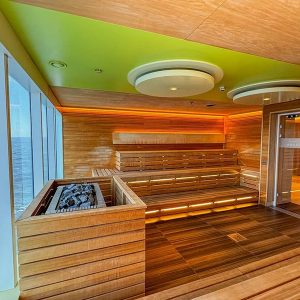Ah, the intoxicating aroma of glühwein, the wooden chalets, and the collection of ‘hand-crafted’ wooden candle-holders. It can only mean one thing. It’s the season for Christmas markets.
A look online reveals around 100 Christmas markets dotted around the UK. They range from the ‘big-hitters’ in places such as Lincoln, York, Bath and Manchester to those held in many of our stately houses.
The origins of Christmas markets can be traced back to Germany in the Middle Ages, and it’s fair to say that Germany still does them best. The German National Tourist Office says that this year the country will put on somewhere between 3,000 and 5,000 markets of one sort or another. It’s an astonishing figure.
It’s no surprise then that the German, French or ‘continental’ theme now pervades many of the UK’s most popular markets. Leading the way is Birmingham’s Frankfurt Christmas Market, billed as ‘The largest authentic German Christmas market outside of Germany or Austria’. It’s hard to argue.
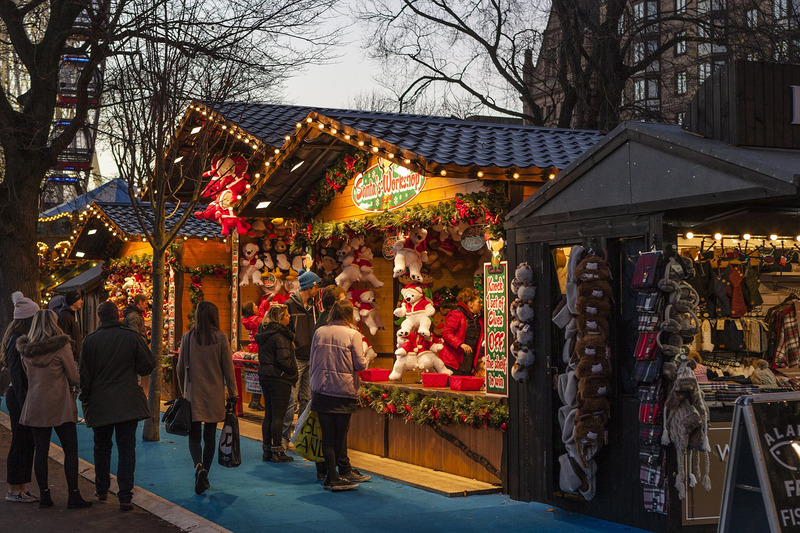 In the UK, Christmas markets offer the ideal opportunity for a day excursion or a short break, possibly tied in with a spot of local sightseeing. The continental European markets lend themselves likewise, with coach or air travel offering flexibility and choice.
In the UK, Christmas markets offer the ideal opportunity for a day excursion or a short break, possibly tied in with a spot of local sightseeing. The continental European markets lend themselves likewise, with coach or air travel offering flexibility and choice.
However, while the thought of strolling among delightful wooden chalets, a glass of mulled wine in your hand, sampling locally produced food and drink to the accompaniment of festive music undoubtedly appeals, a word to the wise. Not all Christmas markets are as they seem.
In the UK, and this does seem to be a UK-centric problem, the heavily promoted ‘Genuine Christmas Market’ can sometimes be little more than a collection of wooden chalets selling the same commercial ‘gifts’ that you see in the next town. It can be a disappointing experience.
So, what should you be looking out for when deciding which market or markets to visit? The very best markets, wherever they are, should feature a high percentage of local food and drink suppliers, or, as in Birmingham’s Frankfurt Christmas Market, suppliers from the town, region and country being promoted. Market marketing, if that’s the correct term, should highlight this. In this instance, as is so often the case, researching online will be time well spent.
If you’re organising a group visit, especially in the UK, look out for the specific ‘group visits’ page on a market’s website. Those markets that know what they’re doing will have details of coach drop-off and parking, driver facilities and special offers. If you don’t fancy organising your own trip, there are a host of tour operators all clamouring for your business.
If you’re planning a short break, it’s worth noting that whether you book your accommodation yourself, or go through a tour operator, you can find yourself paying artificially high prices as hoteliers take advantage of the situation. Many tour operators therefore use hotels in towns several miles away to ensure the customer gets value-for-money.
So, with all that in mind, which markets are worth considering? We’ve picked a few that are worth researching further.
In the UK
Bath
Some 200 chalets transform the historic city centre of Bath into what the tourist office describes as a “magical Christmas shopper’s paradise”.
Birmingham’s Frankfurt Christmas Market
A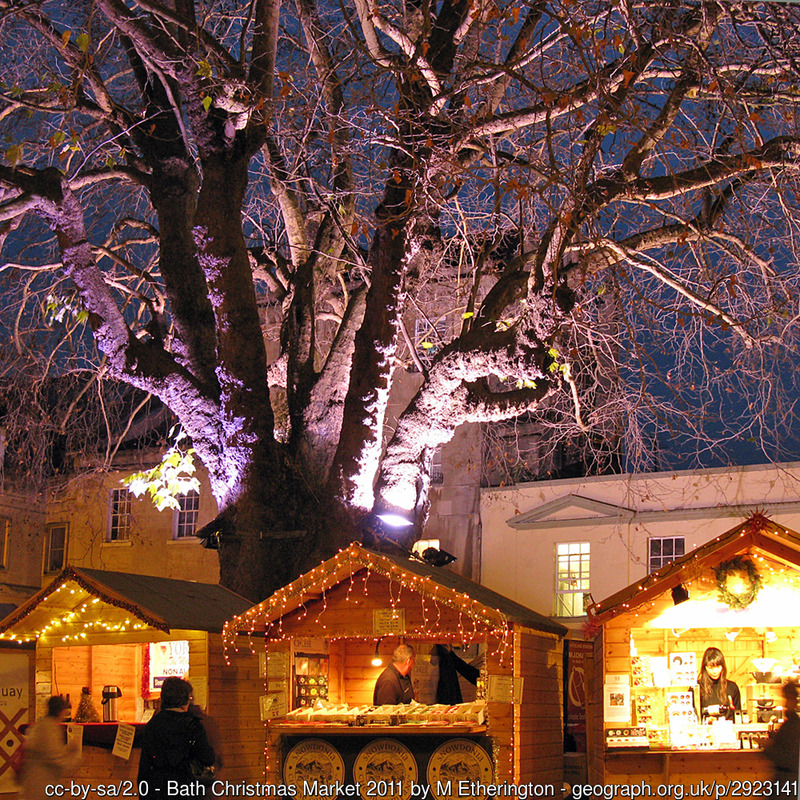 round 120 stalls, offering a large range of traditional goods and gifts and a selection of tempting food and drink including pretzels, schnitzels, bratwursts, roasted almonds, glühwein (of course), weissbeer (wheat beer), or hot chocolate.
round 120 stalls, offering a large range of traditional goods and gifts and a selection of tempting food and drink including pretzels, schnitzels, bratwursts, roasted almonds, glühwein (of course), weissbeer (wheat beer), or hot chocolate.
Gloucester Quays
Gloucester Quays Victorian Christmas Market takes up residence for 10 days in the city’s impressive historic Victorian quayside and the adjoining Gloucester Quays Outlet. More than 250 stalls featuring artisan producers and locally produced food and drink combine with Victorian characters and entertainment.
Lincoln
A four-day festival of food, drink and festive entertainment with 280 stalls nestled in and around Lincoln Castle and Lincoln Cathedral.
Manchester
Some 300 traders spread across the city’s famous Albert Square, St Ann’s Square and many other streets in between. There’s a huge choice of international food, drinks and delicately crafted yuletide gifts.
Rochester
It might only be for two days (2/3 December) but the Rochester Dickensian Christmas is the only market with a ‘guaranteed’ snowfall! Framed by Rochester’s fairytale cathedral and castle, the historic town centre becomes a feast of Victorian delights, including some familiar, fabled characters from Dickens’ much-loved stories.
Salisbury
Salisbury Christmas Market brings together around 75 authentic German-style chalets offering a mix of local and international delicacies and festive foods, and range of artisan gifts.
York
A programme of festive fun and entertainment as St. Nicholas Fair takes over the historic city centre. Visit the ‘Yorkshire Yuletide Village’ for all things Yorkshire, and enjoy the Christmas lights in the Museum Gardens.
In Belgium
Bruges
Famous at any time of the year for its plethora of chocolatiers and cosy cafes, Bruges remains one of Belgium’s most popular Christmas destinations. Add in the intoxicating scent of warm, fresh waffles, locally produced food and drink, and twinkling fairylights and you have all the ingredients for a memorable festive experience.
Brussels
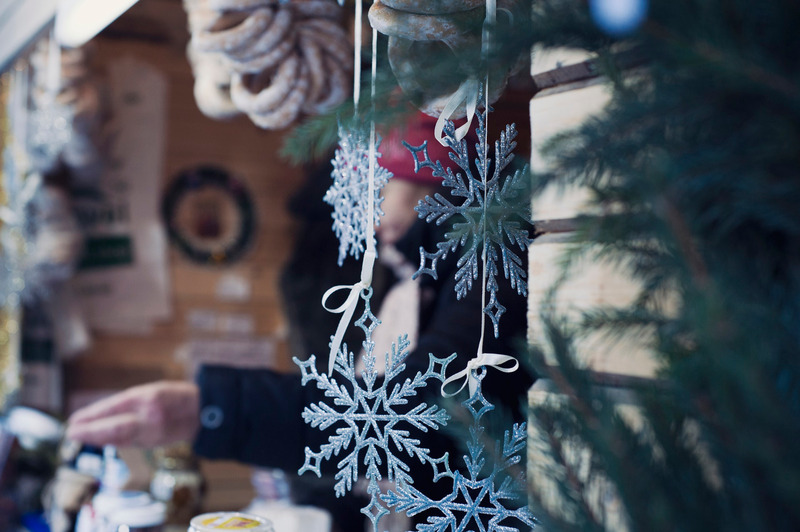 Brussels’ ‘Winter Wonders’ event takes place at the famous Grand-Place, and across the city centre. This year’s event promises a Christmas market with more than 200 chalets, fairground attractions and a Christmas tree and sound and light show on the Grand-Place.
Brussels’ ‘Winter Wonders’ event takes place at the famous Grand-Place, and across the city centre. This year’s event promises a Christmas market with more than 200 chalets, fairground attractions and a Christmas tree and sound and light show on the Grand-Place.
Liège
The largest Christmas Market in Belgium, Liège’s remarkable collection of around 200 chalets attracts around one million people every year. Food and drink are at the heart of the experience, with Liège’s famous waffles competing for attention alongside marzipan, forest mushrooms on toast, sausages, oysters, chocolate, gingerbread, foie gras, mulled wine, Christmas beers and champagne.
In France
Amiens
The ‘Parfums d’Hiver’ (Scents of Winter) is best known for its local produce including aacaroons and tuiles amienoises (almond biscuits) as well as glass, soaps, and angora pullovers. A spectacular ‘son et lumiere’ show is projected onto the town’s gothic cathedral every night.
Arras
Conveniently located for a quick trip across the Channel, charming Arras has around 90 stalls set up in the Grand Place. Try the local speciality of Flemish waffles and enjoy the musical events and street performances.
Colmar
Already a tourist hotspot in the Alsace, close to the German border, Colmar’s medieval architecture provides the ideal backdrop for a very traditional market. Shops try to outdo each other in the decorations competition while the children’s market in Petite Venise is an absolute joy.
Lille
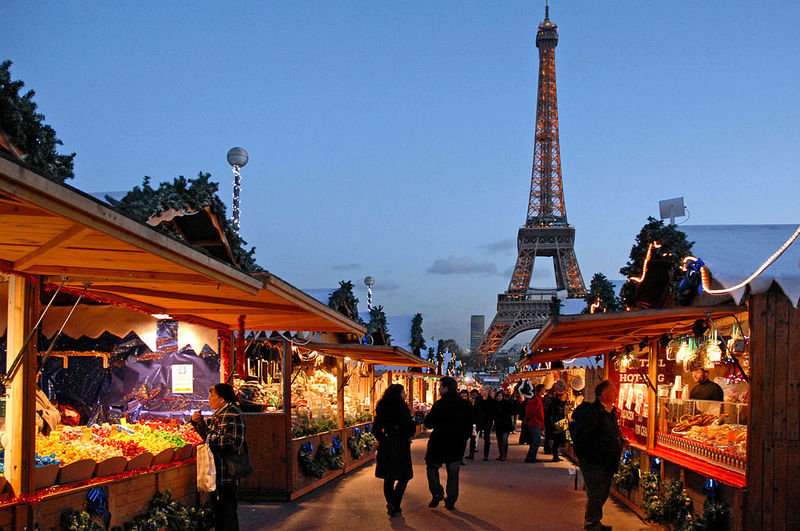 A short hop by Eurostar, Lille hosts one of the most popular Christmas markets in France, attracting 900,000 visitors every year. Around 90 stalls sell traditional produce including Maroilles cheese, chicory pâté and babeluttes (soft caramels). In the Grand Place, a 50-metre-high ferris wheel offers memorable views over Lille’s Flemish-Renaissance architecture, festooned with sparkling Christmas fairy lights.
A short hop by Eurostar, Lille hosts one of the most popular Christmas markets in France, attracting 900,000 visitors every year. Around 90 stalls sell traditional produce including Maroilles cheese, chicory pâté and babeluttes (soft caramels). In the Grand Place, a 50-metre-high ferris wheel offers memorable views over Lille’s Flemish-Renaissance architecture, festooned with sparkling Christmas fairy lights.
Paris – L’Arche de Noël à la Défense
Just to the north of central Paris is the modern business district of La Défense. At its heart is the Grande Arche that marks the end of the Triumphal Way, the east-west axis that connects the Louvre, Champs-Elysées, Arc de Triomphe and La Défense. Sitting in the shadow of the arch is the largest of all the Christmas markets in Paris with around 300 stalls. It’s also regarded as one of the merriest. The Paris Metro and RER rail network offers easy links from across Paris.
Reims
Perhaps it’s something to do with the Champagne, but Reims Christmas market has garnered a reputation as one of the best for pure yuletide joy and Christmas cheer. There are around 135 little wooden chalets selling local crafts, regional delicacies, and probably some champagne. There’s also a dry ski slope for the more adventurous.
Strasbourg
Understood to be the oldest ‘marché de Noël’ in France, Strasbourg’s market dates back to the 16th century. Set in the quaint, medieval old town, it has 300 stalls, making it one of the largest markets in Europe. Each year, another country is invited to set up a market representing its own Christmas traditions.
In Germany
With between 3,000 and 5,000 markets planned for 2017, where do you begin? We recommend Cologne and Frankfurt.
Cologne
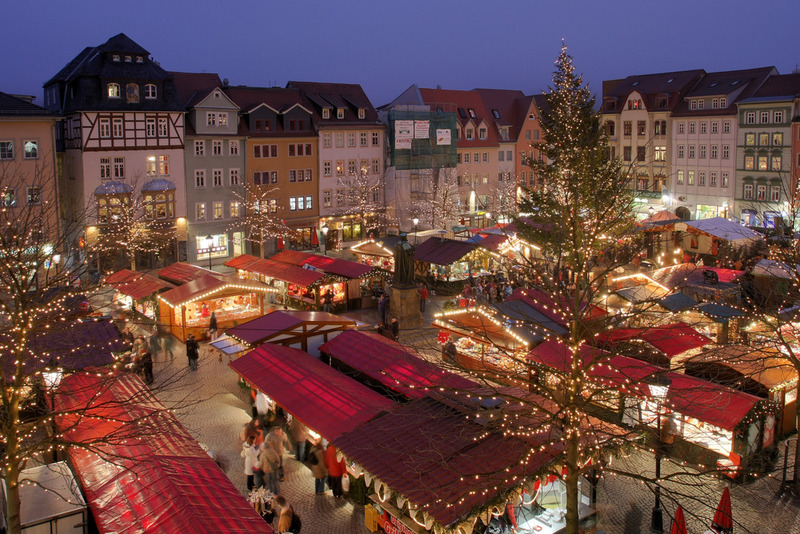 Cologne boasts a number of different Christmas markets dotted around the historic city centre. We like the sound of the one in the Stadtgarten, where more unusual handicrafts will be sold. The main market though sits in the shadow of the famous cathedral, with the chalets arranged around a huge Christmas tree and a stage for a programme of live entertainment.
Cologne boasts a number of different Christmas markets dotted around the historic city centre. We like the sound of the one in the Stadtgarten, where more unusual handicrafts will be sold. The main market though sits in the shadow of the famous cathedral, with the chalets arranged around a huge Christmas tree and a stage for a programme of live entertainment.
Frankfurt
In terms of visitor numbers and size, Frankfurt Christmas Market is one of the largest in Germany. The elaborate and creative stand decorations, the scenic surroundings on the Römerberg and St Paul’s Square, and the huge Christmas tree combine to also make it one of Germany’s most beautiful. Make sure you try Frankfurt’s famous apfelwein cider.
In the Netherlands
Valkenberg
Usefulk links
www.christmasmarkets.com
www.germany.travel
www.findacoachholiday.com

